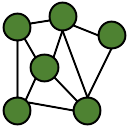 |
Neuron®
The Neuron® is the basis for the creation of open and secure federated networks for smart societies.
|
 |
Neuron®
The Neuron® is the basis for the creation of open and secure federated networks for smart societies.
|
Classes | |
| class | ArchivingTimeAttribute |
| This attribute defines that objects of this type can be archived, and the time objects can be archived. More... | |
| class | ByReferenceAttribute |
| The contents of this field is persisted by reference only. The default behaviour is to persist object fields as embedded sub-objects. By adding the ByReferenceAttribute to a field or property declaration, you tell the persistence layer that persistence of the value is done separately, and that only a reference to the corresponding object is to be persisted. More... | |
| class | CollectionNameAttribute |
| This attribute defines the name of the collection that will house objects of this type. More... | |
| class | DefaultValueAttribute |
| This attribute informs the persistence layer about the default value of a member (field or property). Default values are not persisted, which allows for more efficient storage. More... | |
| class | DefaultValueDateTimeMaxValueAttribute |
| This attribute informs the persistence layer about the default value (DateTime.MaxValue) of a member (field or property). Default values are not persisted, which allows for more efficient storage. More... | |
| class | DefaultValueDateTimeMinValueAttribute |
| This attribute informs the persistence layer about the default value (DateTime.MinValue) of a member (field or property). Default values are not persisted, which allows for more efficient storage. More... | |
| class | DefaultValueGuidEmptyAttribute |
| This attribute informs the persistence layer about the default value (Guid.Empty) of a member (field or property). Default values are not persisted, which allows for more efficient storage. More... | |
| class | DefaultValueNullAttribute |
| This attribute informs the persistence layer about the default value (null) of a member (field or property). Default values are not persisted, which allows for more efficient storage. More... | |
| class | DefaultValueStringEmptyAttribute |
| This attribute informs the persistence layer about the default value (string.Empty) of a member (field or property). Default values are not persisted, which allows for more efficient storage. More... | |
| class | DefaultValueTimeSpanMaxValueAttribute |
| This attribute informs the persistence layer about the default value (TimeSpan.MaxValue) of a member (field or property). Default values are not persisted, which allows for more efficient storage. More... | |
| class | DefaultValueTimeSpanMinValueAttribute |
| This attribute informs the persistence layer about the default value (TimeSpan.MinValue) of a member (field or property). Default values are not persisted, which allows for more efficient storage. More... | |
| class | IgnoreMemberAttribute |
| This attribute tells the persistence layer that the member (field or property) should be ignored. More... | |
| class | IndexAttribute |
| This attribute defines a compound index for the collection holding objects of the corresponding class. More... | |
| class | NoBackupAttribute |
| This attribute informs the database layer, that the corresponding collection should not be backed up. More... | |
| class | ObjectIdAttribute |
| This attribute defines the field as containing the Object ID of the object. When creating a new object, the value of the Object ID field should be equal to null. More... | |
| class | ObsoleteMethodAttribute |
| This attribute defines a method for obsolete properties and field values found in serializations of older versions of the class. The method should take one parameter, a Dictionary<String, Object>, that represents property or field values with no matching properties or fields in the object. The return type of the method should be either void or Task. If a Task, the deserialization of the object waits for the task to complete. More... | |
| class | ShortNameAttribute |
| This attribute defines a short name for a member (field or property). Short names are preferred for serialization. More... | |
| class | TypeNameAttribute |
| This attribute defines the name of the collection that will house objects of this type. More... | |
Enumerations | |
| enum | TypeNameSerialization |
| How the type name should be serialized. More... | |
How the type name should be serialized.
Definition at line 8 of file TypeNameAttribute.cs.